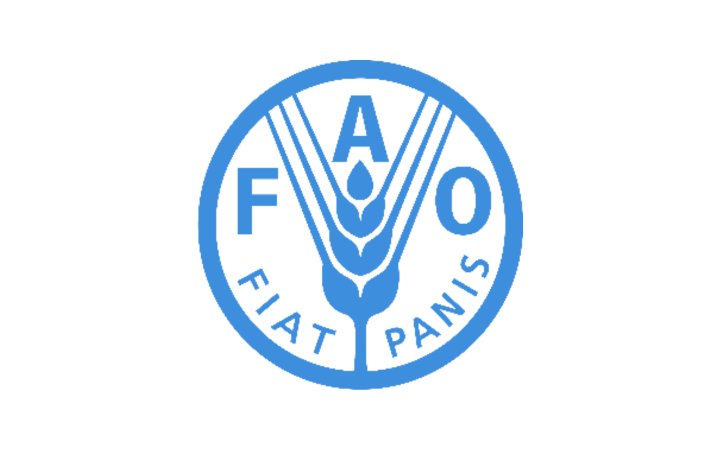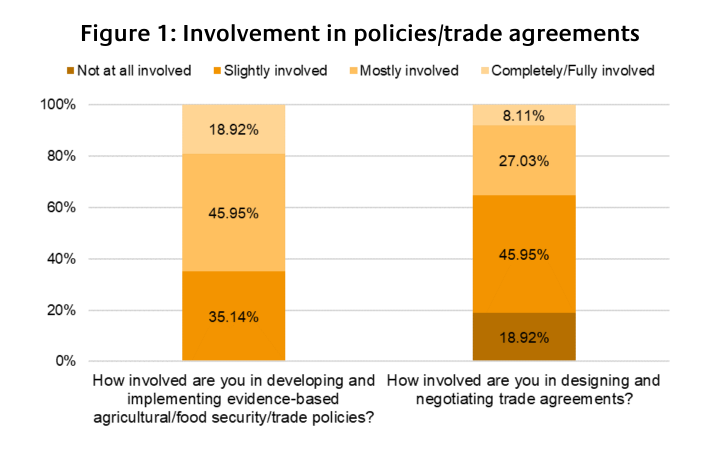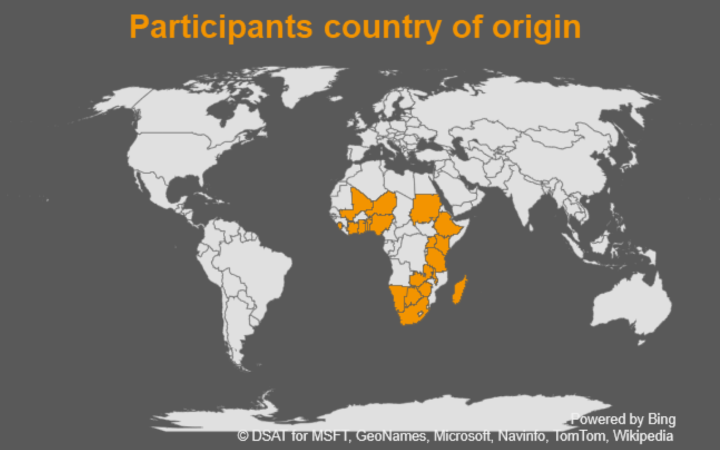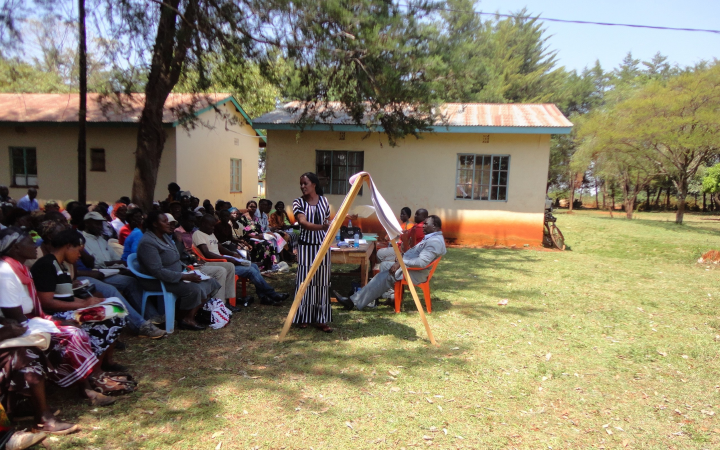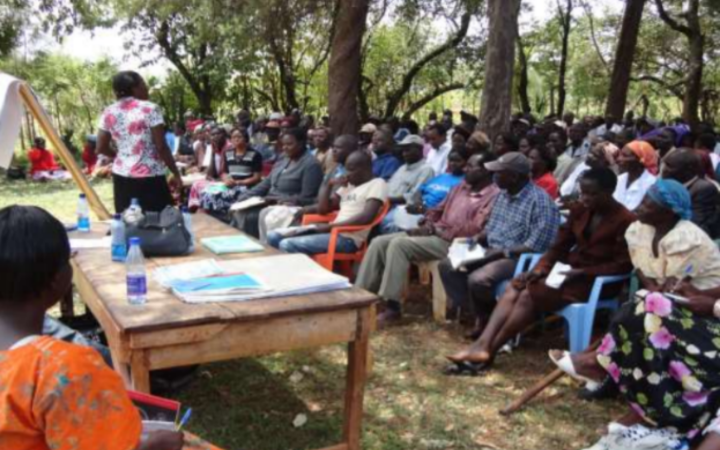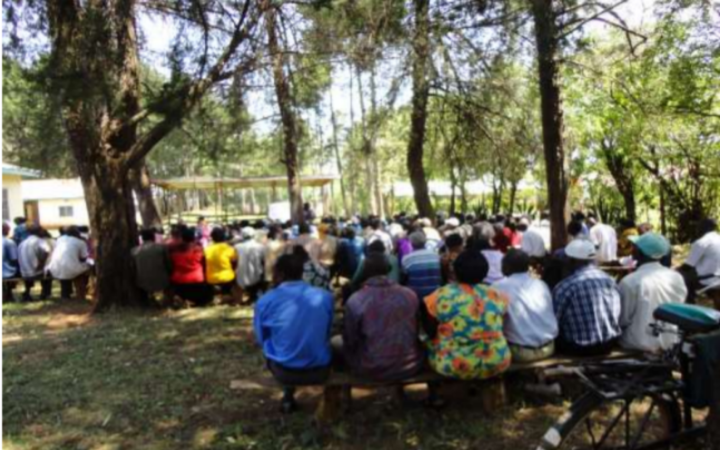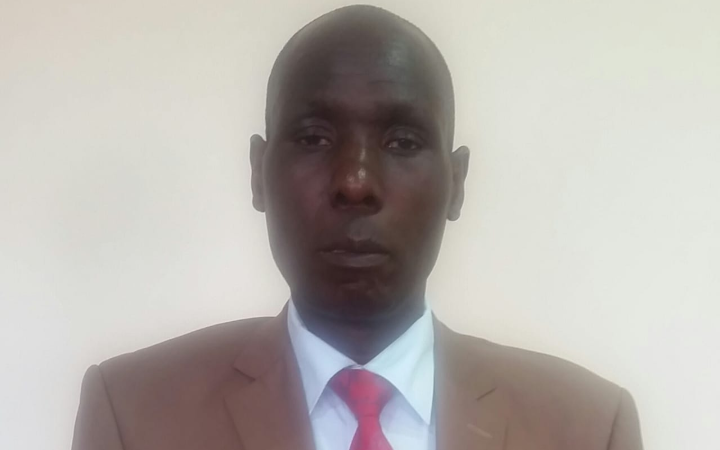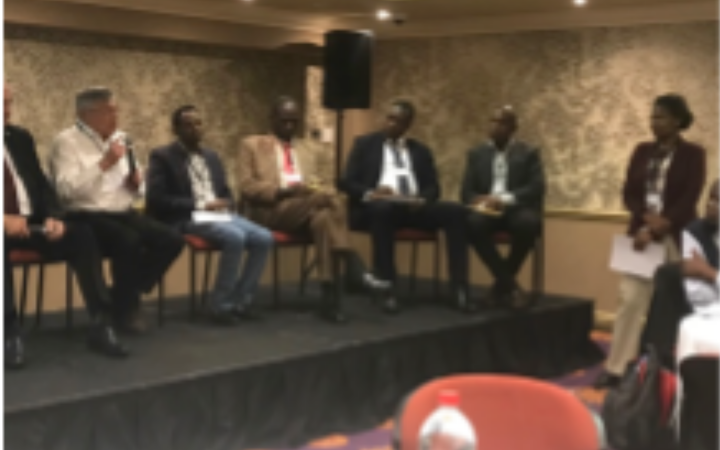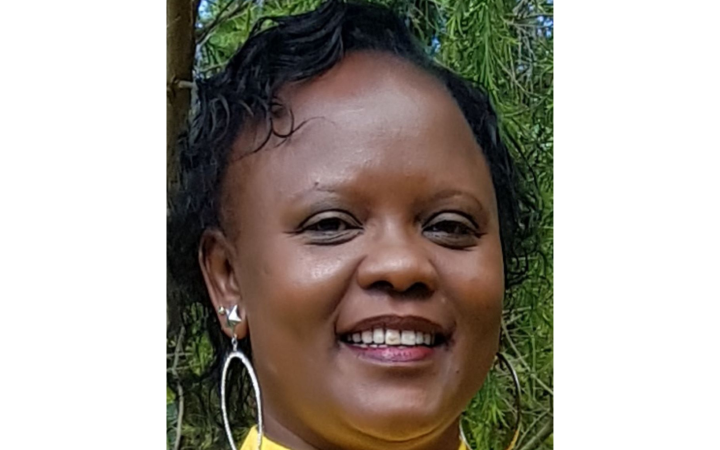A second edition of the FAO and UNITAR Joint e-Learning Course on “Trade, Food Security, and Nutrition” for Sub-Saharan African (SSA) policy decision-makers was launched in October 2019.
The course was expert-facilitated and administered in English over a four week period. It was delivered via the e-learning platform developed by UNITAR with FAO training materials and experts. This second edition was intended to assist representatives from government and related authorities, who are directly involved in the formulation and implementation of agricultural policies and programmes in SSA.
The Learning Objectives (LO) of the course were:
- assess the challenges and opportunities posed by greater openness to trade for food security and nutrition;
- describe different types of trade policy measures, their role in promoting food security and nutrition, and considerations for trade policy design and implementation; and
- discuss the key global policy and regulatory frameworks governing trade, food security and nutrition, including the WTO Agreement on Agriculture and Agenda 2030.
The training was organized in three modules, each of which presented conceptual linkages and practical regional experiences on trade and food security and nutrition. Some of the topics covered were the impacts of trade, food security and nutrition, trade policies and agricultural development, multilateral trading systems, and governance of trade, food security and nutrition.
The course received a large number of applications (1,094) from government institutions, private sector, NGOs and regional and international organizations. In total, 70 participants from 25 SSA countries were accepted. Almost half (46 per cent) of the accepted participants were female. The course was successfully completed by 55 participants, who obtained a certificate of completion. Forty per cent of them were female (22).
According to the end-of-course survey (taken by 44 participants), all of the respondents indicated that they would recommend the course to their colleagues, and 98 per cent of them said that they were satisfied with the course. Although most of the survey respondents had a large experience in the field, 71 per cent agreed that the information presented was new to them and all of them found the information relevant to their jobs and intended to apply the knowledge acquired.
In this Impact Story, we present the results of a survey designed to follow-up on the application of knowledge and skills from participants conducted one year after the course. A case study with the most significant changes of three participants from Kenya highlights specifically the high degree of direct application of the knowledge and skills from the training to their workplace.
The United Nations Institute for Training and Research (UNITAR) and the Food and Agriculture Organization of the United Nations (FAO) has a long-standing collaboration aimed at expanding access to education and training to strengthen capacities of stakeholders, with training activities on a wide range of topics being implemented since 2010.
The partnership builds upon the strengths of both institutions by transforming the knowledge expertise provided by FAO into high-quality learning products and services designed to transfer knowledge, impart skills, and raise awareness and takes full advantage of modern information and communication technology (ICT) for greater outreach and cost-effectiveness.
Application of knowledge and skills of survey respondents
Most of the survey respondents (81 per cent) are government officials involved in the design and implementation of agricultural, food security or trade policies at different levels or in the design and negotiation of trade agreements. Likewise, all the respondents working in other sectors (NGOs, private sector, and international organizations) are involved either in designing and implementing trade policies or trade agreements (See Figure 1). The high level of alignment between the course’s objectives and the participants’ involvement in trade or food systems issues in supported the application of knowledge and skills to their workplaces.
From the 35 respondents who completed the course, only two indicated not having applied or transferred any of the new knowledge. The application rate for LO one and two was 84 per cent, and 71 per cent for LO three. The most common examples of application among the respondents are inclusion of the new knowledge in the decision-making processes of trade restrictions and market strategies, negotiation of trade agreements, elaboration of trade documents and reports for their countries, sharing the new knowledge with their colleagues and designing policy recommendations.
Moreover, 90 per cent of the respondents indicated using the knowledge with frequence (occasionally, often, or frequently). The high level of application can also be explained by the fact that for most of the participants the skills provided in the course are key for their job success and / or performance. More than 72 per cent of the respondents found the skills to be very or fully important.
The survey respondents also indicated that the contribution of the course in their change of behaviors at work has been based mostly on a better understanding of the link between trade with other sectors, more academic knowledge on the development of technical documents, and adequate interpretation of international trade policies. As stated by one participant from Rwanda “The course helped me to reflect confidently on the trade problems caused by the COVID -19, such as export restrictions and their impact on food security, especially in countries that are net food importers.”
Based on the knowledge acquired, I participated in the decision-making of trade restriction of certain foods, including fish, palm oil, beans, among others.
Participant from Burundi
I am a member of an expert team for the development/evaluation of the national export strategy. The training allowed me to better reflect on issues related to trade openness for food security and nutrition in Côte d'Ivoire.
I am a part time lecturer at the University of Zambia, and I have offered some lectures on trade and development, which include trade, agriculture and nutrition aspects.
Participant from Zambia
Since our project is market systems, I have engaged the trade departments on the development of trade policies within the county to align them with the global trade agreements.
Participant from Kenya
Impact Story - Maurine Abungu
Maurine Abungu
Trade Development Officer – Ministry of Industry, Trade and Enterprise Development
Better Knowledge for Negotiating Cross-Cutting Trade Agreements
Ms. Maurine Abungu works as a trade development officer at the State Department for Trade and Enterprise Development in Kenya. Before joining the central government three years ago, she worked for the county government for eight years in the area of trade and enterprise development, focused on the development of SMEs. Besides her professional experience, Maurine has a strong academic background in trade issues gained during her undergraduate studies in economics and master’s degree programme in international economics and commerce. Maurine acknowledges the interest of the Ministry in enhancing the officer’s capacity in trade promotion and negotiations, reflected in a cooperative environment between the employees and a rotation system among the different divisions of the office.
During her three years working for the Ministry, Maurine has been working for the international directorate, handling issues on regional, bilateral, and multilateral trade. She has collaborated in various trade matters related to research trade facilitation, e-commerce, technical barriers to trade, International Trade organizations (ITOs) and trade agreement and negotiations. The Ministry is also in charge of coordination and implementation of the national trade policy across different sectors, collaborating with other ministries and government agencies throughout the process. Maurine is aware that international trade is a cross-cutting issue and understanding the topic is relevant for any area she could potentially work in.
At the time of the course announcement, Maurine had recently been transferred to a desk focused on agricultural policies, an area in which she has little experience. Maurine decided to enrol in the course because she felt she did not have enough insights that could help her to handle topics related to agriculture. Currently, Maurine is no longer working in the same desk, but as a negotiator, she continues to address agricultural issues. According to Maurine:
even if you are not attached to the desk, you have to handle negotiations that include issues with agriculture, because we are negotiating issues that are cross-cutting in an entire value chain, and at the end of the day you are required to have an idea of what those issues are about.
Maurine found the course very relevant for her role as an international trade agreements negotiator, especially the unit of policymaking processes which includes institutional and stakeholder’s engagement. Now, she is able to understand better how to design and implement an effective policy and how the institutions are related to its implementation. Another important learning for Maurine was that key stakeholders are not only those directly involved in the negotiation but also those who could inform and/or be affected by the negotiations, which has improved her participation as a negotiator. Maurine can coordinate better the information needed for the negotiation process. The course also facilitated her understanding of the link between trade, agriculture, and food security, demonstrating that trade is cross-cutting among different sectors. All this new knowledge has been relevant for the negotiation process being carried for the US-Kenya free trade agreement negotiations, in which she is involved, making her work more effective.
Maurine considers that the changes in her performance are possibly also due to the leadership and good work environment and bottom-up approach in the workplace, the great supervision and guidance received and to improved office equipment. For this course edition, for example, two other colleagues participated as well, including her supervisor (with whom we had the opportunity to talk for this Impact Story, see below). She has shared knowledge with her colleagues and encourages them to apply for the next editions of the course. Maurine considers she has improved the quality of her work in trade policies but believes that reconnecting with other course participants would be ideal to have more knowledge on the regional trade development and agreements. Maurine expressed much interest to exchange views (through forums) with them to understand how her colleagues are implementing the knowledge gained during the course.
Impact Story - Fred Simiyu
Fred Simiyu
Director of Research and Trade Policy Analysis Department– Ministry of Industry, Trade and Enterprise Development
Leading Trade Negotiations
We were fortunate to talk with Mr. Fred Simiyu, who holds a PhD in entrepreneurship and also works for the Ministry of Industry, Trade and Entrepreneur Development at the State Department for Trade in Kenya. Fred oversees the Kenyan Trade Negotiation Council, a team of seventy stakeholders responsible for preparing Kenya’s position in international trade negotiations, including the Twelfth WTO Ministerial Conference (MC12) paper. According to Fred, the course was crucial to continue working in the MC12 paper and strengthen his knowledge in international trade, gained in his 28 years of experience in the field.
Before leading the Research Department, Fred was the Deputy Director of the International Trade and Head of the Multilateral Division. Fred realized that the FAO-UNITAR course covered topics of what he was doing in the multilateral division (trade policy, export and import policy) and decided to take the course to improve his performance. Besides, Fred did not have any previous training experience on food security, though he had empirical knowledge. In March 2020 he prepared the first draft of Kenya’s position paper for the MC12, which was an opportunity to incorporate the knowledge gained during the course about agricultural negotiations and fishery, applied and bound tariffs, green box flexibilities, and Aggregate Measure of Support (AMS). Fred believes that they are now better placed as a country to negotiate international trade matters in those areas. Given his work performance - Fred obtained 100 per cent in his performance appraisal of 2019, he was promoted to his new position and officially assigned Chair of the Technical Committee to fully update the MC12 position paper, consisting of fifteen technical officers of the Ministry. He says that the course allowed him to “shine”, particularly his work on the above-mentioned position paper.
Even though Fred enrolled in the course with specific goals for his previous position, the skills gained during the course have also been useful for his new role, which started in June 2020. As a Director of Research, Fred is now more focused on trade policies strategies and analysis and incorporation of the principles of The Big Four Agenda, Agenda 2030, and African Agenda 2063 into the Kenya medium term expenditure framework for effective implementation. A good example of this is the encouragement of women’s participation in trade-related activities, especially export of niche products; but they also attempt to incorporate other groups such as youth and persons with disabilities. With the course, he was able to better understand topics on food standards, production support in terms of mechanization, farm inputs, and marketing the products. Fred recognizes that many policies in Kenya are focused on improving the export standards and industrialization of the sectors, but they are still an agricultural country, therefore the knowledge acquired from the course about agricultural issues was relevant for his work. Fred also says that he has better information not only for his country but for regional trade dynamics which is an asset for the inaugurated African Continental Free Trade Area (AfCFTA).
After the course, he has also prepared and presented seminar papers of Kenya in international negotiations in African Union and World Trade Organization workshops. He made presentations in Senegal and Johannesburg, South Africa, about e-commerce sector, policies and strategies at play, management of fisheries sector in Kenya in relation to WTO negotiations and Kenya’s Minimum Residue Levels(MRLs) management. Fred considers that the course gave him the confidence to answer the questions of the audience as a discussant. Fred is aware of the needs and potential of Kenya in trade negotiations and hopes to sometimes have face-to-face courses with other African policy-makers.
Fred cares about his country. He shared with us some of his goals, including contributing to poverty reduction and reduction of corruption. During Kenya’s Independence Day Celebrations on 12th December 2020, Fred was awarded Head of State Commendation (HSC), Civilian Division by His Excellency President Uhuru Kenyatta for his exemplary role in nurturing an export culture through coordinating multilateral trade programmes.
He is also very much interested in improving women participation in trade and tries to encourage his colleagues. By supervising and mentoring Maurine, he was able to observe her improved performance after the course. He describes his role as guiding and advising her on trade policy review matters and describes Maurine as hardworking and their relationship as friendly.
Impact Story - Beatrice Tonui
Ms. Beatrice Tonui has an impressive schedule: she works as the Regional Agriculture Policy and Institutional Capacity Coordinator at the Kenya Crops and Dairy Markets Activity (KCDMSD), a project funded by USAID. In parallel she is undertaking a research-based doctoral project, has her own project initiatives and manages a family of five. Beatrice has a vast experience in the agricultural sector and food security, which she believes cannot be separated from trade. Beatrice says that her passion is to empower people, which is reflected in her professional life.
Beatrice’s work in the KCDMSD project concentrates on the seed industry, agricultural policy, and food security. Part of her duties is to enable trade policies that support market system in the agriculture sector in areas of social inclusion, productivity, and markets in the Nyanza region of Kenya. Prior to taking up her current job, Beatrice worked for the county government as the Minister in charge of the Department of Agribusiness, supporting small farmers' engagement in domestic and international trade. Beatrice told us that she feels very proud that during her time in the county government, she supported the production of sweet potatoes and, with the help of other stakeholders, they could connect the farmers with the UK market and supported Bomet Cooperative Union to produce sweet potatoes bread using what remained after the first grade for export was selected. Beatrice hopes to continue making an impact through her work in the agricultural sector, ultimately leading to improving child nutrition and allowing each child to receive three meals a day.
Given that Beatrice’s technical knowledge in trade policies was limited compared to her experience in agriculture and food security, she enrolled in the course because she wanted to know more about the links between the food systems, trade, and policies and how to enable policies to continue making an impact. Beatrice emphasizes that “you do not only do production, but you have to link the farmers to the market”. Beatrice found the course information very useful. With the course, she could understand regional trade and the regional economic blocks, and how policy could be improved to promote the economy. Before the course, Beatrice was only focused on food systems, but now she sees the correlation between trade and food system after having completed the course.
Moreover, Beatrice has been able to link knowledge from the course to her work in the USAID project. Her main work is to help counties to develop or formulate policies that will enable private sector to thrive and allow to market system to work. Beatrice, through her work at KCDMS, has started to guide the Department of Trade in the counties to develop policies that promote trade in the agricultural sector, where she had incorporated the knowledge about policies that she has developed from the course. Beatrice says that this could not have been possible without the training from FAO and UNITAR. Thus, for her the most valuable part of the course was the policies and trade agreements modules. Additionally, thanks to the course Beatrice has a technical knowledge of global taxation and agreements, which was new to her. Beatrice also feels more confident after taking the course, because “when you are equipped with knowledge you don’t remain the same. You talk with confidence because you have really learned, and know it is clearer and you talk based on evidence and at the point of knowledge”.
As a personal project, Beatrice has a resource centre for agricultural demonstration in her home in the space that previously was her garden. In the resource centre, Beatrice teaches and shows farmers how to manage their land and how they can combine crops and apply technology with a small piece of land, especially for fruit crops and nutritional African leafy vegetables. She is also sharing knowledge on transport costs, border taxes and tax policy. She sees this as her way to give back to the community. Her PhD project also reflects a desire to improve development projects in her community. In her research, she looks at the moderating effects of government policies on the relationship of strategic management practices on donor projects sustainability in Kenya, as she observed that many large projects collapsed after the donor left the field. Her objective is to find answers to this phenomenon to continue the contributions of the projects in her community.
Conclusion
The various positions in the workplace allowed for the application of knowledge and skills from the course and positive changes at the workplace. The course was useful to strengthen knowledge from the activities that participants have been developing even before the course, but shape them in a more technical way. It has also complemented the knowledge for those with less knowledge in one of the areas of study (trade or agriculture/food security). Interviewees were experienced already but highly motivated to complement existing knowledge and skills and improve not only their individual performance but also the country’s performance in international trade negotiations or improving farmer’s performance and consequently child nutrition. Examples of application on international level are the US-Kenya Free Trade Agreement negotiations and a position paper for the MC12. Examples at the county level include guiding counties on policies aligned with national, regional and international principles of trade.
The module that helped contribute most to positive changes and more effective work (as perceived by the participants) was the design and implementation of trade policy measures, considering that it is applicable to different sectors and levels.
Overall, the course received good feedback although the platforms used for the online training sessions apparently did not allow for interaction of the participants apart from the learning activities. A space for improved networking and a community of practice during and after the course is suggested for the participants.
We were fortunate to be able to talk to our Kenyan colleagues and coincidentally, one was the supervisor of another and was able to observe improved performance of the latter following the course. This is additional evidence that the knowledge and skills developed from the course are indeed leading to change.


